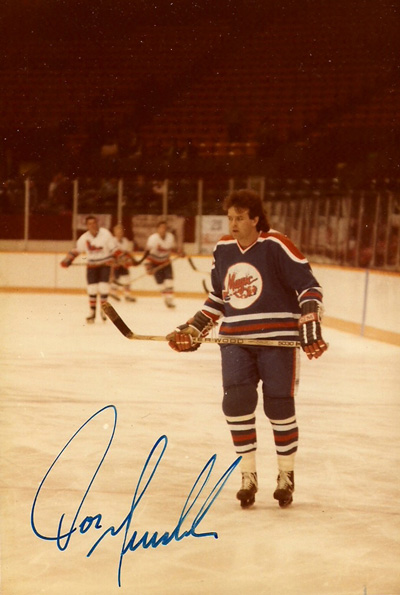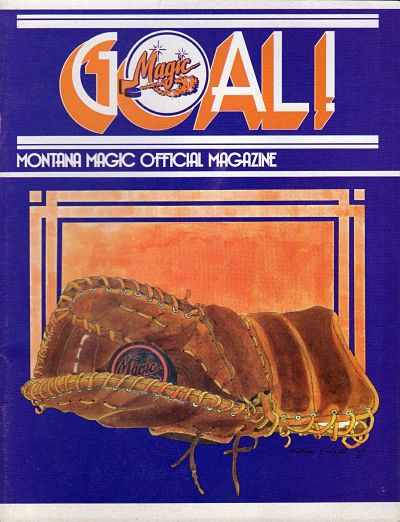Central Hockey League (1983-1984)
Tombstone
Born: April 22, 1983 – The Wichita Wind relocate to Billings, MT1Trimmer, Dave. “Ex-Horn McTaggart: fans will enjoy CHL”. The Gazette (Billings, MT). April 23, 1983
Folded: May 1984
First Game: October 7, 1983 (W 7-6 vs. Tulsa Oilers)
Last Game: March 31, 1984 (L 6-2 @ Salt Lake Golden Eagles)
Adams Cup Championships: None
Arena
Yellowstone Metra
Opened: 1975
Marketing
Team Colors:
Ownership & Affiliation
Owners: Larry Gordon & Ermineskin Band (Wilton Littlechild, councillor)
NHL Affiliation: St. Louis Blues
Background
The Montana Magic were a Billings-based minor league hockey venture that struggled through a single season before collapsing along with the rest of the Central Hockey League (CHL) in May 1984. Franchise owner Larry Gordon was a long-time pro hockey exec who held a variety of management positions in the World Hockey Association during the 1970’s. Soon after the WHA-NHL merger in 1979, Gordon resigned his position as Executive Vice President of the Edmonton Oilers to purchase Edmonton’s top minor league farm club in the CHL.
Gordon’s Wichita Wind franchise lasted three seasons in Kansas. But by the spring of 1983, Gordon had lost his affiliation with the Oilers and hundreds of thousands of dollars. He took on a partner, selling off a 40% stake in the team to the Ermineskin Indian Band of Alberta, Canada for $400,000. Soon afterwards, in April 1983, Gordon signed a letter of intent to move the Wind to the 8,700-seat Yellowstone Metra in Billings, Montana.
Scramble For Players
The Magic expected the lowly New Jersey Devils to continue as the team’s parent club after the move from Wichita. But the Devils instead purchased the Portland, Maine franchise of the American Hockey League during the summer of 1983. Gordon hastily struck a partial working agreement with the NHL’s St. Louis Blues to stock the Magic with 10 players for the 1983-84 season. Gordon announced the team would go “independent” for much of the rest of the roster. That meant signing veteran players who weren’t subject to mid-season recalls by NHL parent clubs, but whom Gordon and the Ermineskin Band would be responsible for paying themselves.
Among the independents was Reggie Leach, the Canadian aboriginal sniper and Philadelphia Flyers cult hero who set an all-time NHL record with 80 goals during the 1975-76 regular season and playoffs. In the fall of 1983, the 33-year old “Riverton Rifle” was only three years removed from his last 50-goal campaign in the NHL.
On opening night of the 1983-84 season, Leach’s game-winner with 13 seconds left vaulted the Magic over the Tulsa Oilers at the Metra on October 7, 1983. But in a grim sign of things to come, only 1,799 fans showed for the Magic’s home debut.
Midway through the season, the Magic added Don Murdoch, a rising star with the New York Rangers during the late 1970’s whose drug & alcohol problems consigned him to minor league journeyman status by the dawn of the 1980’s. Murdoch was a favorite of Magic owner Larry Gordon and followed him from Edmonton to Wichita to Montana.

CHL Struggles
The 20-year old Central Hockey League staggered into the 1983-84 season with only five active franchises. The league incorporated twenty Olympic warm-up matches against the U.S. and Canadian Olympic teams into the regular season standings to fill out the schedule. NHL President John Ziegler cited the CHL’s sprawling geography as one of the league’s Achilles heels in a 1984 interview with Dave Molinari of The Pittsburgh Press. Billings was 1,200 miles from Indianapolis and 1,000 miles from Tulsa.
“One of the problems in the Central League is the tremendous distance involved in moving teams from one place to another. That imposes a cost burden which, in these days, has become very disproportionate to the kind of attendance dollars generated. Now you hear of a team that may lose $750,000, $800,000 or a million dollars a year and produce from that operation – if they’re lucky – one player a year. That player becomes a very expensive commodity.”2Molinari, Dave. “One on one: John Ziegler”. The Pittsburgh Press (Pittsburgh, PA). May 21, 1984
Demise
In mid-February 1984, the Tulsa Oilers ownership ran out of money and abandoned the club. The Oilers were forced to finish the season as a travel team, operating out of a Residence Inn in Denver. The Magic were next. By early March, Gordon’s group could no longer fund the club’s payroll. The Magic were forced to postpone a March 6th game against the Colorado Flames when the St. Louis Blues recalled five of their players and six unpaid independents refused to play, including Leach.
The Ermineskin Indian Band bought out Gordon and guaranteed enough funds for the Magic to complete the 1983-84 season. The team staggered to last place finish with a 20-52-4 record.
On the bright side, right wing John Markell, allocated by the St. Louis Blues, led the Central League with 44 goals.
On May 21st, 1984 the Central Hockey League voted to dissolve after 21 seasons. The Ermineskin Band stopped paying the team’s few remaining employees the following week, bringing the Magic era in Billings to an end.
Montana Magic Shop
[auction-nudge tool=”listings”]
Links
###


One Response
I was there for that season. I used to sit right behind the behind the penalty boxes. You actually sat above them and there was no glass. There was just a small table that separated the two boxes. They guy I sat next to was named Dennis, who got banned for a few games after throwing a beer on a Tulsa Oiler player. The USA Olympic team came to play in Billings and it only about 3,000 were there. You would have thought there would have been more.
I was at that opening game and was among the 1,700 fans. Larry Gordon came out and lectured us that the seats should be full. I still have my autographed Montana Magic stick that I won for getting second place in their photo contest. Sadly, all my photos got destroyed in a flood. Lots of good memories of that terrible season. One of the last games of the year, there was a game where the referee could not make it to the game. They played the game with two local linesman, but no ref. Both could call penalties. One of the biggest fights of the year broke out between Mike Siede and Jeff Brubaker. Brubaker was getting called up and Mike wanted to give him a parting gift. There was just a large curtain that separated the two locker rooms. As the players were pushed off the ice, they continued to fight. It took several sheriff officers to end the fight.